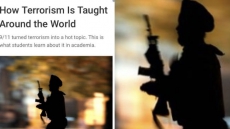PHNOM PENH, Cambodia — Ten Westerners arrested in Cambodia for allegedly posting photos on social media showing themselves engaged in sexually suggestive dancing may have offended local standards of morality, but should be expelled from the country rather than jailed, one of their lawyers said Tuesday.
The 10 — from the United Kingdom, Canada, Norway, the Netherlands and New Zealand — were arrested last Thursday when police raided a party at a rented villa in the northwestern town of Siem Reap and found people "dancing pornographically" at an event organizers called a pub crawl. Siem Reap is near the famous Angkor Wat temple complex.
Two Canadian women — Eden Kazoleas, 20, and Jessica Drolet, 25 — are among the foreigners detained. Global Affairs Canada said it was providing consular services to the Canadians in Cambodia.
The detainees face up to a year in prison if convicted, and if they go to trial, it would likely happen in the next few months, said one of their lawyers, Sourng Sophea. He said the families of some of the detainees have contacted him by phone from overseas, but none had come yet to visit.
Two other lawyers have joined the defence, and visited the detainees in jail on Tuesday. One of them, Chhouy Sopheak, said the 10 were in good health and detained in acceptable conditions. He said they gave their versions of events and denied any wrongdoing.
Sourng Sophea said some of the photos posted by his clients showed them at a party, some drinking by a swimming pool and some of the women in bikinis, but none showed them having sex or exposing themselves. According to the law, he said, they should be deported or have their visas cancelled, but should not be held in pretrial detention.
"I admit that they have done something wrong according to morality in Cambodian society, but their crimes did not warrant them being charged or put in jail," Sourng Sophea said by phone.
He said that when the 10 had been taken into custody but not yet charged, he sent a three-page note to the Siem Reap provincial police and prosecutors, asserting that they had not committed any serious wrongdoing, were innocent of producing pornography, and should be released, but was turned down.




